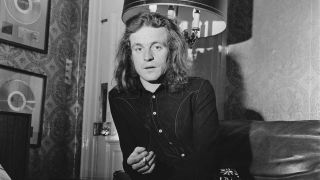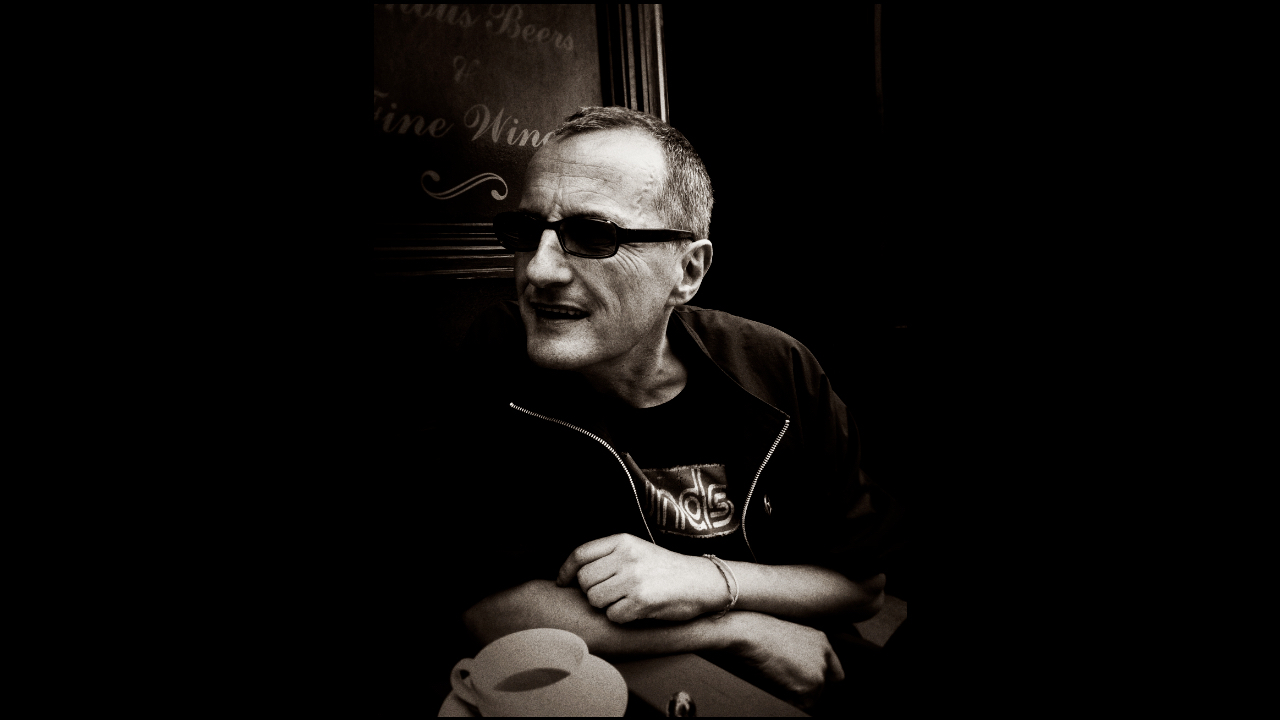The late Jack Bruce was regularly hailed as an avatar of modern music. A highly respected figure on the British jazz and R&B circuit in the early 1960s, he was best-known for his revolutionary bass playing with the original supergroup, and arguably the greatest power trio of them all, Cream.
Speaking to Classic Rock in 2008, he recalled his first encounters with Ginger Baker and Eric Clapton, magical times with the enigmatic and sadly doomed bandleader Graham Bond, the brilliance of George Harrison and Jimi Hendrix, the bizarre eating habits of Mountain's Leslie West and more.
All this and more from the man who was responsible for the formation of Pink Floyd – and wasn’t entirely sure whether that was a good thing.

Graham Bond
When I first met Graham he lived in Romford, he was a salesman and he was very confident. But then as time went on he changed; he became this other person who got into this magic. And then he became very enigmatic, yeah [laughs]. He got into heavy drugs; he didn’t do well behind that one. Things went a bit wrong in his life. They came to repossess his organ during one show because he hadn’t paid his maintenance or alimony, whatever.
The next time I saw him after a long time, he came to see me when Cream were playing Madison Square Garden. He showed up backstage with his then girlfriend. He was wearing this robe right down to the ground and he had a magic wand. They both looked very outstanding. I’ve got some of his artefacts that somehow came to me after he died. I think everyone was too scared to take them. I’ve got this five-point star with a ruby in the middle, also a Peruvian magic axe with symbols on it. The guy who gave them to me was terrified of the stuff, and I thought if I said no that could make things worse [laughs].
John McLaughlin
He was doing sessions but he wasn’t doing great. He’d just made that amazing solo record, Devotion. Both Tony Williams and Miles Davis wanted him to join their bands but he didn’t have the money to get to the States. At the time, I was recording what I thought was a trio. I thought, well, I could get John a quartet, he could get paid and everybody’s happy.
When I first knew him he was a good guitar player, but I wouldn’t put him any higher than that. Then I think he got into his meditation, Sri Chimnoy, and it seemed to really work for him. He became very turned on musically. The next time I played with him was with Lifetime and he was quite phenomenal.
Ginger Baker
The very first time I met Ginger was in 1962. I was playing in a trad band and we were playing at the Cambridge May Ball. I heard this amazing music coming from the cellar, and I went down and there was this astounding band. The first thing I noticed was this drummer. He was the loudest drummer I’d ever heard and he looked so weird as well – like a caveman. And his kit looked weird as well. I went up to Dick Heckstall-Smith, the saxophone player, and asked if I could join.
Eric Clapton
I’d vaguely heard of him before, and the first time I met him was at a jam at the Windsor Jazz Festival. That was the first time I played with Eric, and I remember being quite impressed with him then. And then he started coming down to a few of our gigs when I was with Graham Bond.
Cream
I’ve recently realised that I’ve had a certain role in that band. It’s quite funny. I was watching a quiz programme a couple of weeks ago and one of the questions was: “Jimmy Page was the lead guitarist in: a) Cream, b) Black Sabbath and c) Led Zeppelin.”
And the contestant said: “I know it’s not Cream, because I used to like that band. That was the band with Eric Clapton, Ginger Baker and…” I was shouting at the telly: “Oh no! Please remember my name!” “…And Jack Bruce, I think it was.” I breathed a sigh of relief.
Jimi Hendrix/Pink Floyd
I first met Hendrix when we [Cream] did a gig at the Regents Polytechnic. Coincidentally, the guys that became Pink Floyd were in the audience, and apparently seeing that event made them become Pink Floyd. When I saw them recently, they told me that. I knew they were there, but I didn’t know that we were responsible for them getting together.
Whether that’s a good thing or a bad thing I leave that for you to decide. I always thought that Pink Floyd were a band for people who don’t like music or rock’n’roll. So anyway, back to Hendrix.
We were playing Regents Polytechnic. I was just having a pre-gig pint in a pub across the road and in comes this guy who turns out to be Jimi Hendrix. Now, we had already heard about Jimi on the grapevine. Jimi came up to me and said: “Hi. I would like to sit in with the band.” I said it was fine with me but he’d obviously have to check it out with Eric and Ginger.
So we went across to the gig, and Eric immediately said yes and Ginger said: “Oh, dunno about that” [laughs]. So he came on and plugged into my bass amp, and as far as I can remember he just blew us all away. Hendrix had a positive effect on everybody, especially guitar players.
He came to the sessions when we [Cream] did White Room in New York and was very encouraging about the song. He came up to me and said: “Wow, I wish I could write something like that.” I said: “Jimi, what you’ve got to realise is that I probably nicked it off you.”
George Harrison
I met George during the session Cream did for Badge, and I was very impressed with his playing [under the pseudonym L’Angelo Mysterioso]. I took it for granted that people like McCartney and Lennon were brilliant but didn’t really analyse it. But when you actually play with George you could see what an amazing guitar player he was, doing things that I hadn’t even thought of.
West, Bruce & Laing
West, Bruce & Laing played the late, lamented Rainbow in Finsbury Park. It was a really great gig and the audience went bananas. My manager, Robert Stigwood, came out and handed me a bottle of champagne but it was wrapped up, for some reason, in tin foil. I was so excited that I threw it into the crowd. It must be a thing that I do. As I launched it into the air I thought: “Fucking hell! I’m just about to kill somebody. This is terrible.”
And I threw it so hard that it went right to the back and hit the wall and then bounced off. I went backstage and Leslie West’s manager, Bud Prager, comes in with blood pouring from his face and didn’t know what happened. Prager, a terrible guy, got hit by it, so everything was alright [laughs]. Fantastic result! I was really made up. Leslie West had a lovely sound on his guitar. That’s the first thing that comes to mind.
The first time I met him and Corky Laing was with Mountain. What can I say about West, Bruce & Laing? It was a band, it was an experience. It disintegrated into a welter of smack, unfortunately. The 60s were really innocent and nice and romantic; the 70s were a bit heavier, more serious and certainly had worse drug use going around.
I always wondered how Leslie could stay fat while he was on heroin. He used to have a secret stash of food, while the rest of us ‘normal’ folk would have a stash of drugs. If you went for a meal with him he’d never eat anything. That way people might think his size was due to glandular problems. Then later at night he’d have a food roadie that he’d boss around: “Hey, gimme a cheeseburger!”
They’re always trying to get in touch with me and want to play with me. So I get my manager to email back really abusive things like: “Tell them that I don’t want to play that fucking crap music again any more” or something. And they still keep trying. How do you get these guys to stop?
Frank Zappa/The Mothers Of Invention
I’ve got a lot of respect for Frank, but it was always the Mothers that I loved. When I was living in Germany, over 20 years ago, I got a phone call from The Mothers and I went to see them. They were living in this one little room, cooking spaghetti on a little hob. And I was thinking: ‘Fuck me! This ain’t right. This is The Mothers we’re talking about here.”
It really annoyed me. And what really got to me was that they inducted Frank into the Rock And Roll Hall Of Fame but the rest of the guys didn’t get any recognition. They were certainly affected badly by that.
Gary Moore
I love Gary. I’ve played with him on and off over the years. I organised a band with Gary, Gary Husband [drums] and myself. I thought about changing my name and calling it The Three Garys. We wanted to do some more gigs but Gary Husband had some other commitments. So we had to get this other fella, Ginger Baker, in to take his place. Gary was very meticulous about rehearsals, quite rightly.
Ginger always said: “I don’t need to rehearse,” and he always got things wrong. I remember him storming into Brixton Academy where we were rehearsing, I could hear his voice: “I’ll kill that fucking Jack Bruce!” He’s taking it out on me and I hadn’t even seen him yet! But it was my fault we were rehearsing. That’s Ginger. We’re like the Odd Couple. Having said that, he is one of the greatest drummers of all time.


